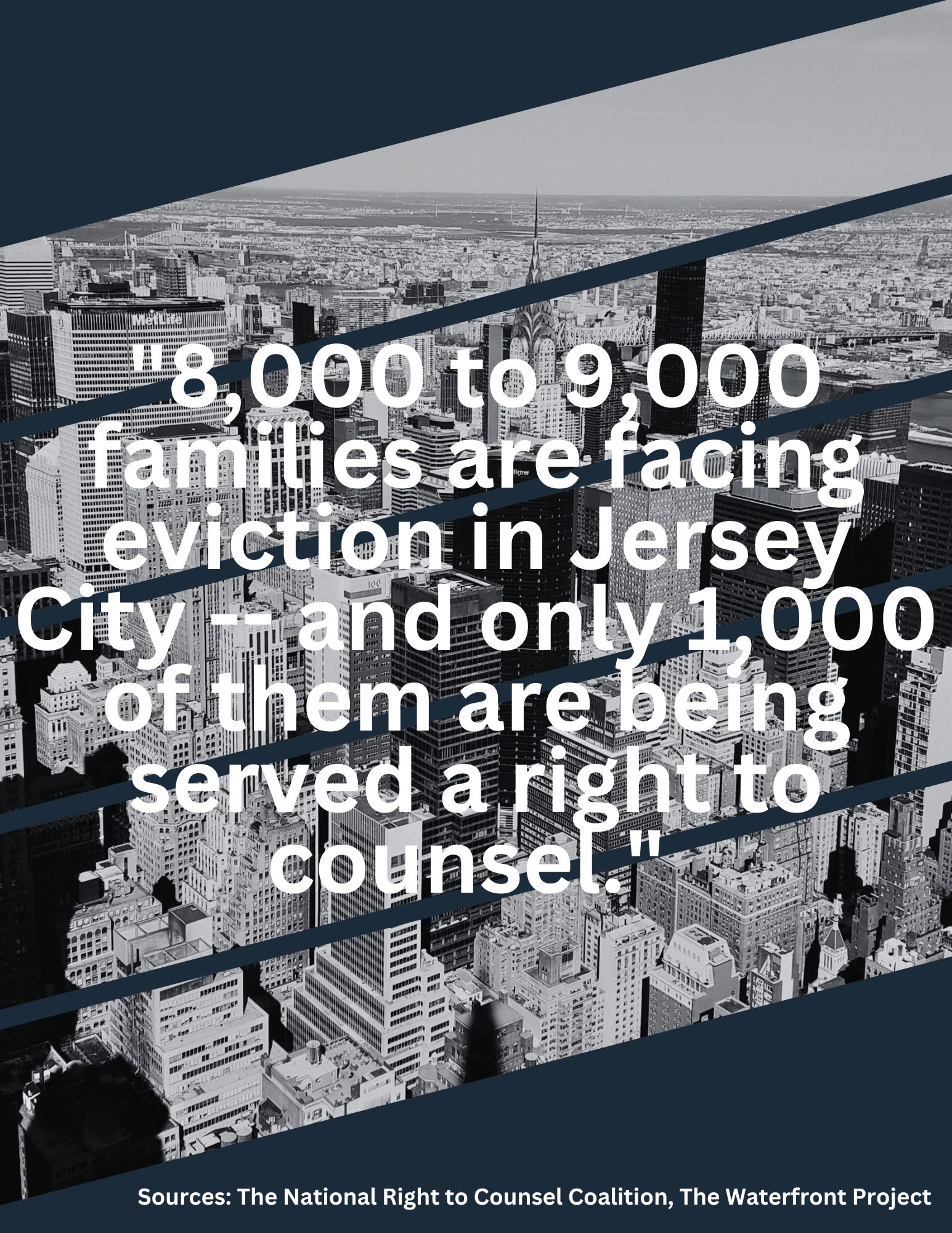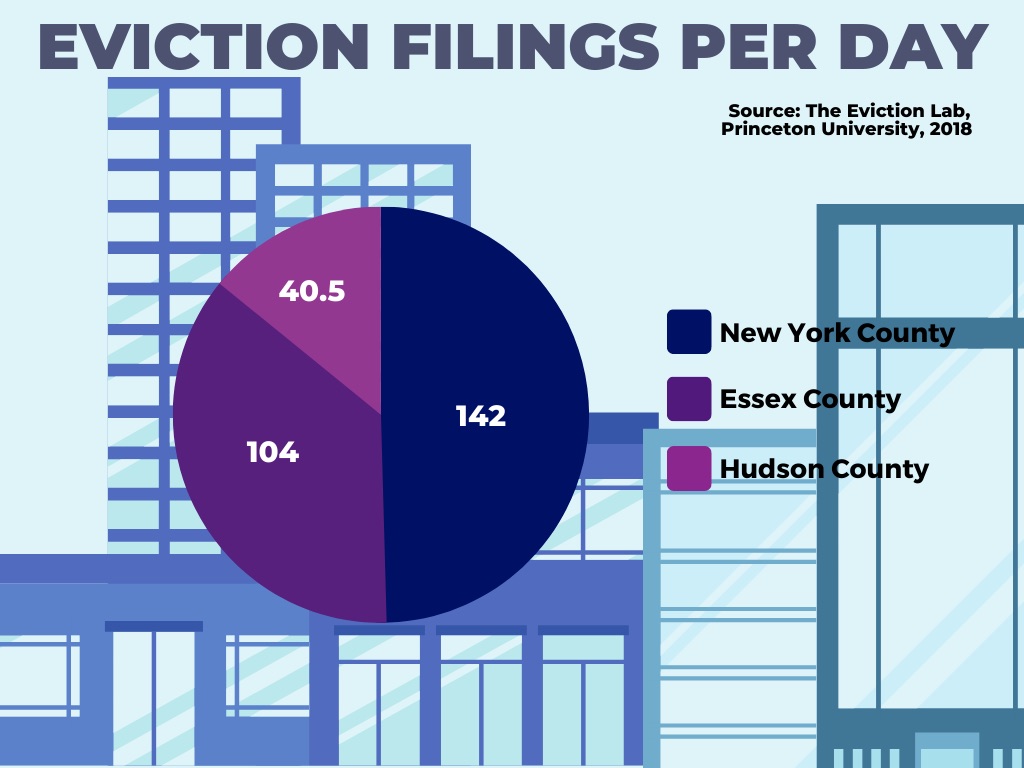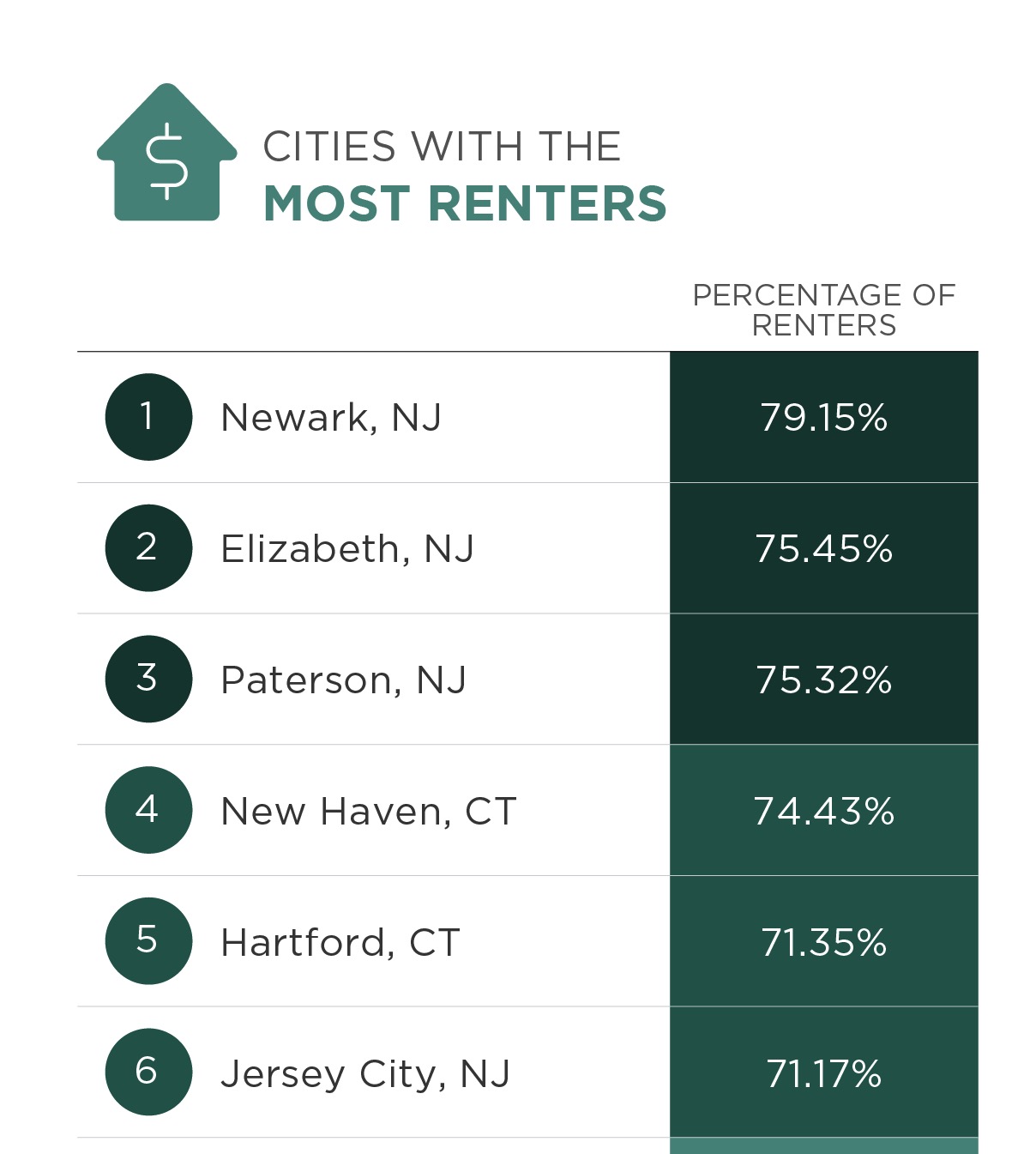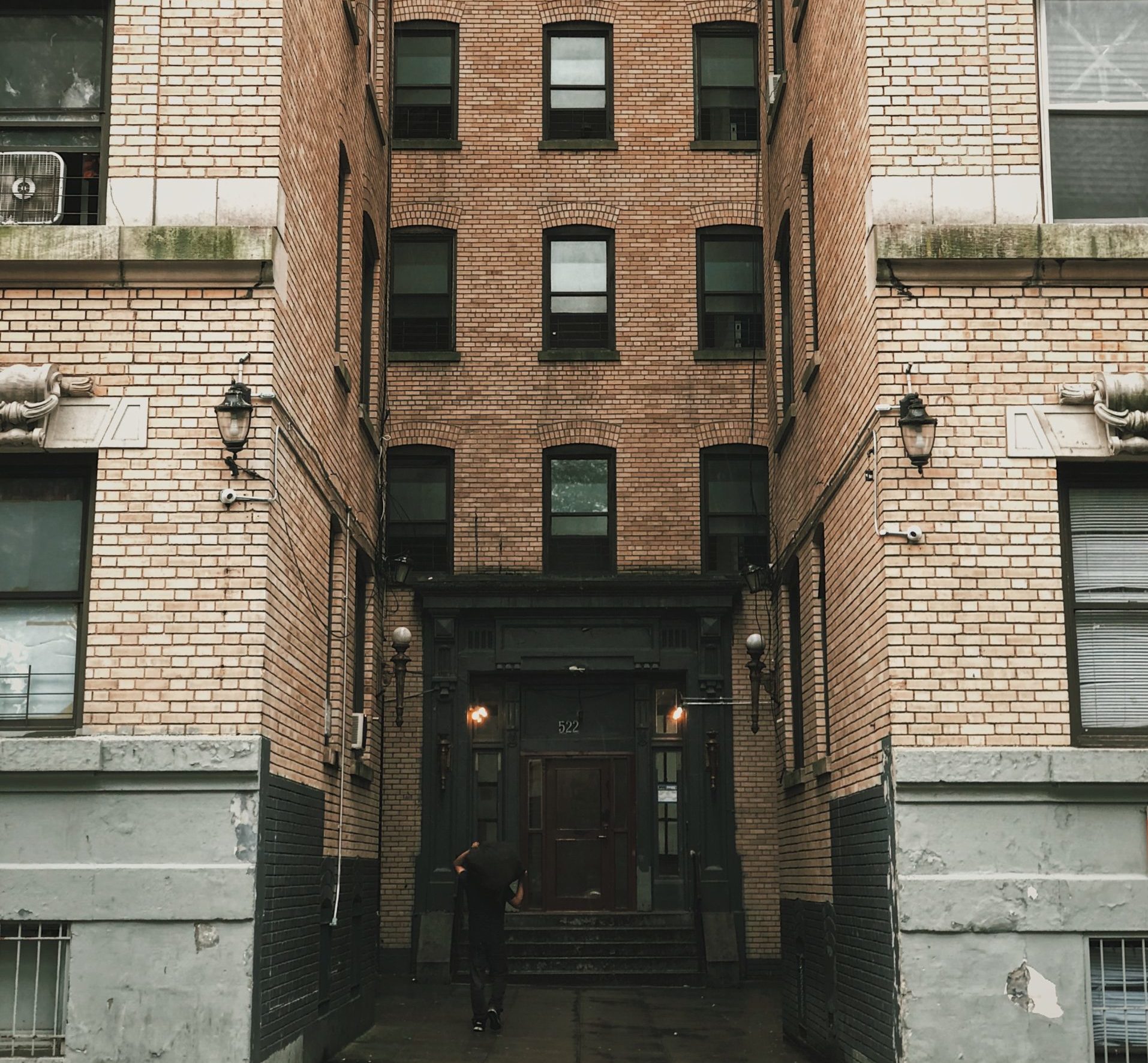Jersey City resident Joel Brookes carried through his days working as a union representative company for healthcare workers.
One day, one of the members he represented received an eviction notice. The member asked Brookes to come with her and say to the court that she was employed and that she was able to make up the rent she owed to her landlord. However, because this wasn’t the member’s first hearing, the judge told her that they were not able to extend the notice any longer, resulting in them sending a sheriff to evict her.
The judge said to the woman that she had two hours to pack up her things.
Brookes had to witness the woman, who was a single mother, tell her son that they were losing their home. The woman was a survivor of domestic abuse, which prompted her to miss work and be behind on bills and rent.
Brookes immediately took action to help her by calling elected officials, which as a result, was able to find them emergency housing in a hotel in Tonnelle Avenue. Had this not been done, the single mother and her child would have become homeless.
Eviction cases like these are not uncommon in Jersey City — which faces the highest amount of evictions in Hudson County and one of the top most expensive cities for rent in the United States.
While a moratorium was enacted for tenants in New Jersey during the coronavirus pandemic, along with Jersey City passing laws for rent freezes, most rental assistances have now been lifted, leaving tenants in Jersey City struggling to pay rent; pushing them to the brinks of eviction and to a likelier chance of not being represented in housing court.
Reasons for eviction vary.
Over the years, tenants in Jersey City, and in many urban cities, have had to face rent increases, dealing with corrupt landlords either misleading tenants or failing to maintain services as a way to intentionally evict them.
Brookes even noticed himself, and others on his block, were being overcharged with rent.
Brookes, who now helps organize with the North Jersey Democratic Socialists of America “Right to Counsel JC,” fights along with others for housing justice in Jersey City, advocating for an official right to counsel program to help with affirmative representation for tenants.
The Right to Counsel campaign in Jersey City launched on July 24, 2022. According to Julia Tache, Media Communications Chair to Right to Counsel JC and treasurer for the North Jersey Democratic Socialists of America (NJ DSA) Chapter, the launch prior consisted of weekly canvassing, doing diligent research for right to counsel and creating a petition that has garnered over 700 signatures for the ordinance.

Back in 2021, Right To Counsel JC was also assisting in a city council campaign for Brookes, who was running for Ward B councilmember, pushing for solutions on affordable housing and rent issues in rent-controlled buildings.
While not winning election, he continues with Tache and other community members in setting the stage for a more equitable Jersey City – especially in an economy facing high inflation, making it hard for working class people to afford their homes.
“Right to Counsel is a ‘one drop in a very big bucket’ of reforms that have to happen for working class people to be in power,” said Tache. “ However, we think it’s a necessary protection that has to pass to at least give people leverage if experiencing difficulty with landlords or eviction.”
What is a ‘right to counsel’?
A ‘right to counsel’ is a legal guarantee that all tenants will be given an attorney in housing court when facing eviction.
While the right to a lawyer, the right to due process and the right to a fair trial are given to defendants in criminal court – a constitutional right under the fifth, sixth and fourteenth amendment – certain protections are not always carried out in housing court, or are only limited to criminal cases, and not civil ones.
Moreover, 83% of landlords across the country were represented in civil cases compared to tenants, only by 3%, which creates the likelihood of an eviction order to proceed – a process favoring landlords, as certain tenants cannot afford representation. Because of this, a right to counsel has become a national campaign to provide universal coverage for tenants facing eviction.
Now, three states and 15 cities have enacted a right to counsel for tenants over the past four years.
Before the coronavirus pandemic, over 3.6 million evictions were filed every year.
With the pandemic and high inflation, the amount had been estimated to increase. The consequences of an eviction can lead to homelessness for families and individuals – which can minimize educational and economic prospects – hospitalization, incarceration and criminal prosecution. Even just an eviction filing can prevent further housing opportunities and remain in a tenant’s housing record. According to the National Coalition for a Civil Right to Counsel, tenant representation decreases the likelihood of those consequences.

In addition, the NCCRC had analyzed a sample of the effectiveness of a right to counsel in five states: Oklahoma, Massachusetts, California, Minnesota and Denver, Colorado; finding that legal representation increases the chances for tenants remaining in their homes by over 70%.
Stout LLC, a financial analysis company who has produced extensive right to counsel reports in the past, had also found that a right to counsel program would lead to more than 90% of tenants avoiding displacement.
Stout LLC also conducted cost/benefit analyses of establishing a right to counsel program in New York City back in 2016, finding that the cost of sheltering individuals from homelessness were $25 million, funded by the city, state and federal government. Their IBO report saw that a right to counsel program will reduce shelter cost savings by $143 million, while reducing for non-city shelter funding by up to $90 million – finding that the cost/benefit of city council Intro 214-A would be $100-203 million.
What are some reasons for an eviction filing?
According to NJ Courts, reasons a landlord may file for an eviction in landlord-tenant court are due to the following:
- The tenant has failed to pay rent
- The tenant is often late to paying rent
- The tenant has repeatedly acted in a disorderly manner.
- The tenant has caused destruction or damage to the property willfully or through gross negligence.
- The tenant has violated the terms of the lease or other document.
- The landlord is required to board up or demolish the property for health and safety reasons.
In certain cases, the landlord must also give the tenant a written notice to cease disorderly conduct and violation, and can continue with the eviction if the tenant continues the conduct mentioned prior after receiving the notice.
Tenants could also use defenses, along with landlords, in eviction cases such as problems with habitability, unregistered rental property, illegal tenancy, abatement and more.
Other pushes for eviction
Due to the rise of developments in Jersey City, displacement has occurred at a frequent rate for working-class Jersey City residents.
The phenomenon of transforming working-class residential areas into luxury, residential spaces for the upper-middle class — otherwise known as gentrification — has left many longtime residents feeling priced out of their neighborhoods.

Because Jersey City is close to New York City, new residents see living there as a cheaper option, ironically, compared to other parts of the New York city region.
The lack of homes being built in New York and Bergen County have driven rent increases in Jersey City, especially among rent-controlled buildings — driving eviction and homelessness up.
Who suffers from evictions the most?
While an eviction can happen in any part of Jersey City, and around the country, the data shows how it can disproportionately affect an individual based on ethnicity, gender and income.
The Eviction Lab at Princeton University, is a research tool used for data analysis to help better understand the eviction crisis in the United States. Through their findings, eviction filings and rates were higher among Black renters than White renters. Their study has also shown that Black and Latinx renters are the ethnicities most disproportionately threatened with getting evicted from their homes.
In the Black and Latinx communities, women are also 16% more likely to be evicted than men, with the gap being much smaller among White renters. The NCCRC had also confirmed the Eviction Lab’s results for Black women suffering from evictions twice as much as White tenants.
While the Eviction Lab’s study was last updated in December of 2020, because of the coronavirus and post-pandemic outcomes, the numbers have been predicted to increase.
Eviction filings in New Jersey
According to the Eviction Lab’s statistics in 2018, Hudson County had faced 40.5 eviction filings per day, which would equate to 14,782.5 filings per year.
The Waterfront Project, a non-profit organization that provides legal services for tenants in Hudson County, had estimated half of those filings being from Jersey City, at an amount of 7,391.25 of eviction filings against Jersey City tenants per year.
The Eviction Lab has reported that over 11,000 households are at risk for eviction, with the Waterfront Project and other organizations like Northeast New Jersey Legal Services and Community Health Law Project only representing over 1,200 of tenants. In a statement, the Waterfront Project estimates over 6,191 unrepresented tenants facing eviction filings in Jersey City.
In comparison, Hudson County’s eviction filings are only half of the amount of Essex County; who have faced over 104 filings per day, as of 2018 statistics. In a NJ Spotlight news article, attorneys reported that Newark, the state’s largest city, has held the majority of cases within Essex County, with over 40,725 eviction filings, according to the Administrative Office of the Courts (AOC).
Because of the two-year banning of evictions during the pandemic, a backlog of pending landlord-tenant cases exists as a result of the moratorium. At the end of November 2021, the Housing and Community Development Network of New Jersey reported 44,610 eviction filings pending, according to statistics from AOC.
The number of eviction filings are still projected to increase.
What Could Be Done
The movement for a right to counsel has been led by organizations like the Democratic Socialists of America, Right to Counsel NYC Coalition and the NCCRC. Other legal organizations, community organizers and policymakers have also played a role in advocating for tenant representation.
Tache, being Media Communications Chair for Right to Counsel JC, has created social media blasts and wrote out to local media outlets as a way to push for the right to counsel campaign – either through physical materials or online resources.
In addition to canvassing and collecting signatures in their petition, Right to Counsel JC has also worked closely with Jersey City Councilmembers Frank Gilmore and James Solomon to push for the ordinance to the Jersey City Council.
Solomon, along with Gilmore and Councilmember Yousef Saleh, have worked together to draft legislation for a right to counsel program for tenants in Jersey City.
According to Solomon, the legislation is flexible, allowing the director of the Right to Counsel office discretion on presenting a plan for running the office to the Jersey City Council for approval. He said that the ordinance for a right to counsel in the city will emulate that of Newark’s, with the office falling under the broader housing department of the city.
Like Newark’s right to counsel program, Solomon said the city’s office will offer attorneys employed by the city, non-profit attorneys who represent more clients and individual attorneys who also will receive contracts from the city.
“It will give the city flexibility to handle cases internally, as well as create partnerships with other attorneys who have experience and can provide further resources,” said Solomon.
Despite non-profits like the Waterfront Project and Northeast NJ Legal Services already providing legal services to tenants, Solomon said he cannot envision the city’s right to counsel not having non-profit legal providers as part of the range of services.
The ordinance would have a clause where the director of the office is issued a right to proposals, meaning the office would extend contracts to in-house and external attorneys, allowing for better expertise and staffing. However, not all contracts with the city’s right to counsel office would be guaranteed, as certain non-profits have limitations on who they’re able to represent.
Overall, a range of partners to the right to counsel office is essential in order to serve how the ordinance is written: which is for every Jersey City resident to be entitled an attorney regardless of immigration status, if they’re a tenant and meet the income qualifications.
Concern towards right to counsel ordinance
While a right to counsel is seen as a universal concept of representation for everyone, advocating for housing as a human right, Jersey City had to limit the coverage it can give under a right to counsel program due to its funding source.
The ordinance stated that the funds for the right to counsel office will come from development fees, which is authorized under New Jersey’s Fair Housing Act. Because of its regulations, any money raised by development fees must be used for people with incomes who are low to moderate. A family of 1 can qualify if they fall under the area median income of $64,000 and below, whereas a family of four qualifies if making $92,000 and below.
Solomon said the program had to be restricted due to its source of funds because they legally could not use the money to serve someone who earns above the threshold. However, he said if they could find additional funding, in the long run, they can expand their services — yet as of now, Solomon said that it is all they’re able to do.
Other concerns brought by the Jersey City Council include the impact it can have for smaller landlords, along with other logistical structures of the office, such as its location and how the office will be set up.
The legislation was introduced on April 12, and from then, was sent to the Planning Board for review. According to Solomon, because development fees will pay for the program, and will ultimately impact development, the Planning Board will provide its advisory to the city council.
The Planning Board met on April 25 and recommended the council to adopt the ordinance. Solomon said amendments might be made, in order to garner the majority of the council’s approval, so that it can be voted upon on May 24.
If the ordinance passes in June, development fees will start being collected up to two years, which will prompt the office to open and hire attorneys. Hudson County had passed a similar program aid for tenants, ending however in 2025. Solomon said that fees, and other sources of funding, will continue to be collected to establish a permanent office by 2025 or 2026.
In the meantime, legal services like the Waterfront Project and Northeast NJ Legal Services have pledged to continue to provide representation and ensure due process for tenants, yet still supporting a right to counsel initiative for Jersey City through a service that can represent tenants at a much wider scale.
“We have to keep people in their homes. It is the moral thing to do, the fiscally responsible thing to do and it’s about building a stable community,” said Solomon.


